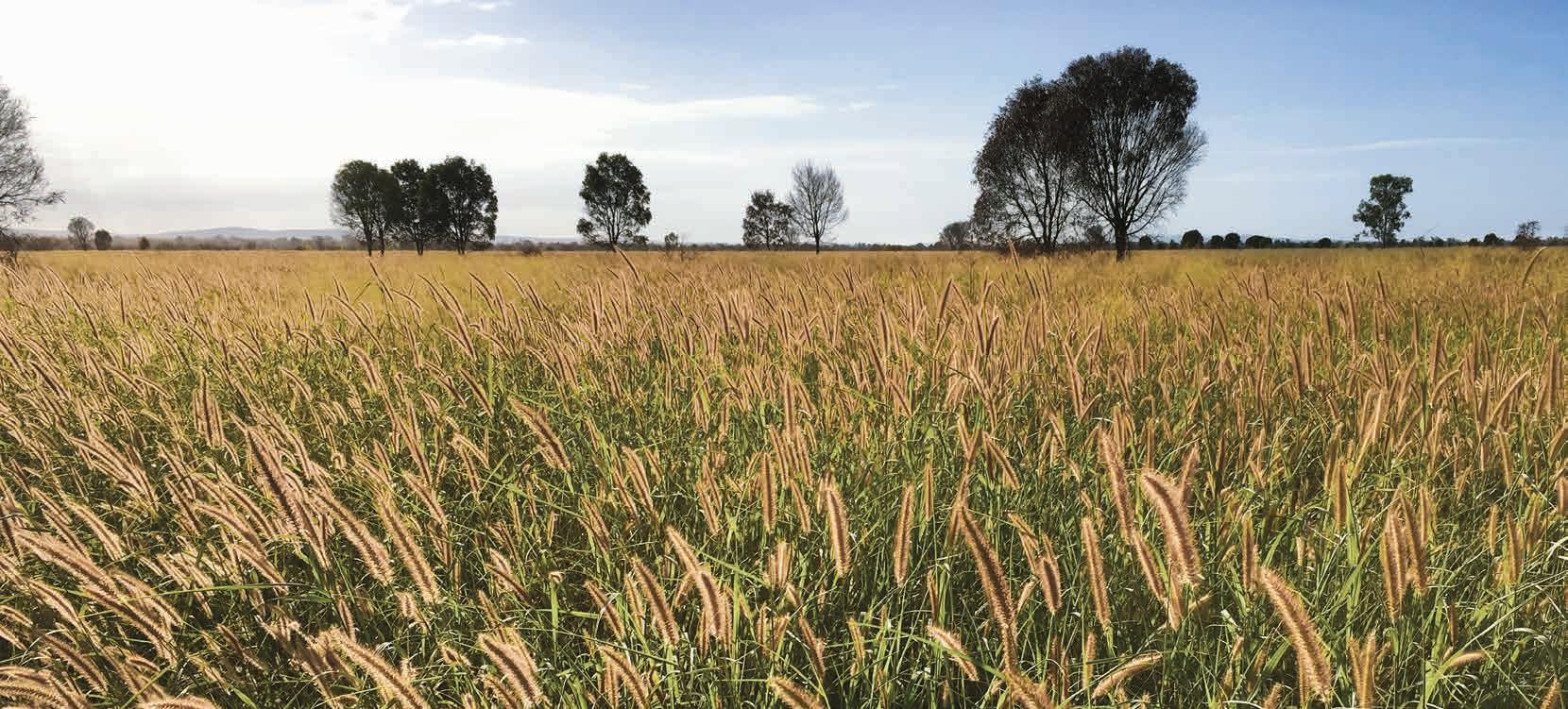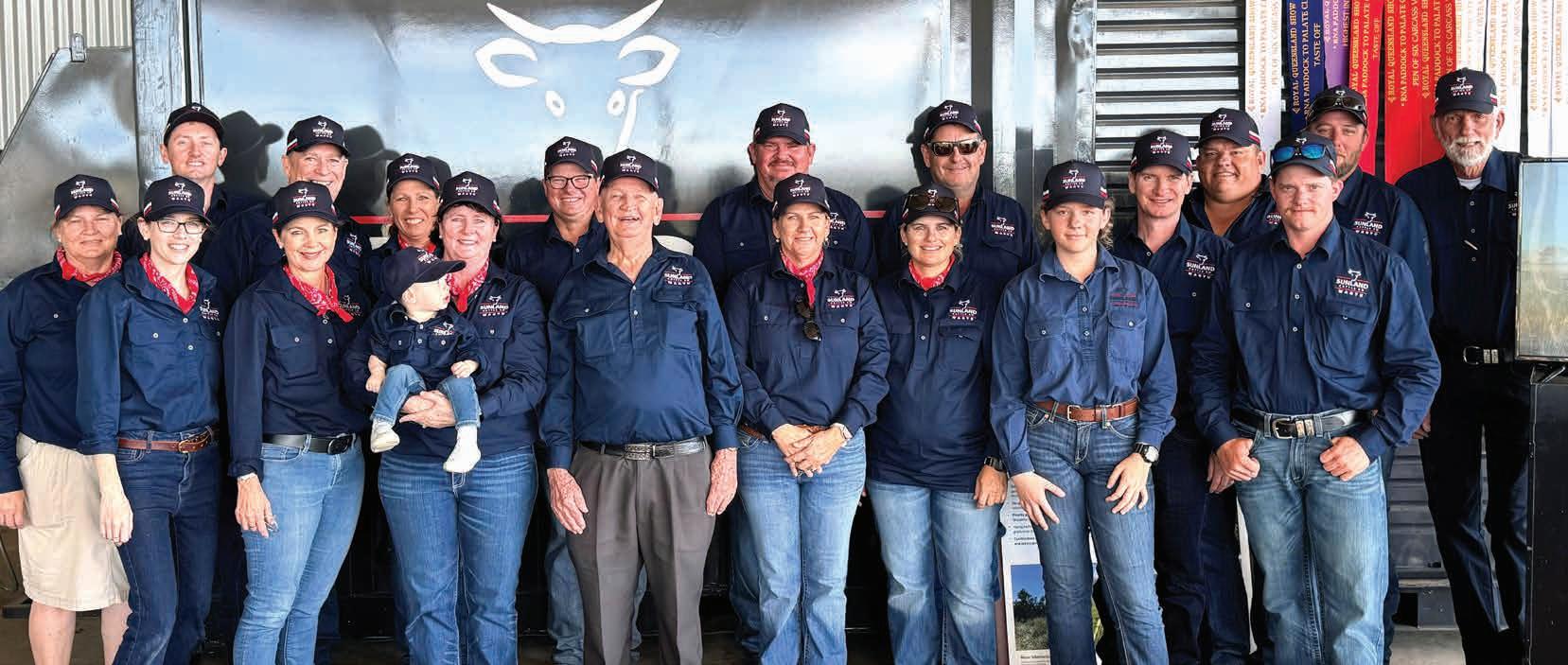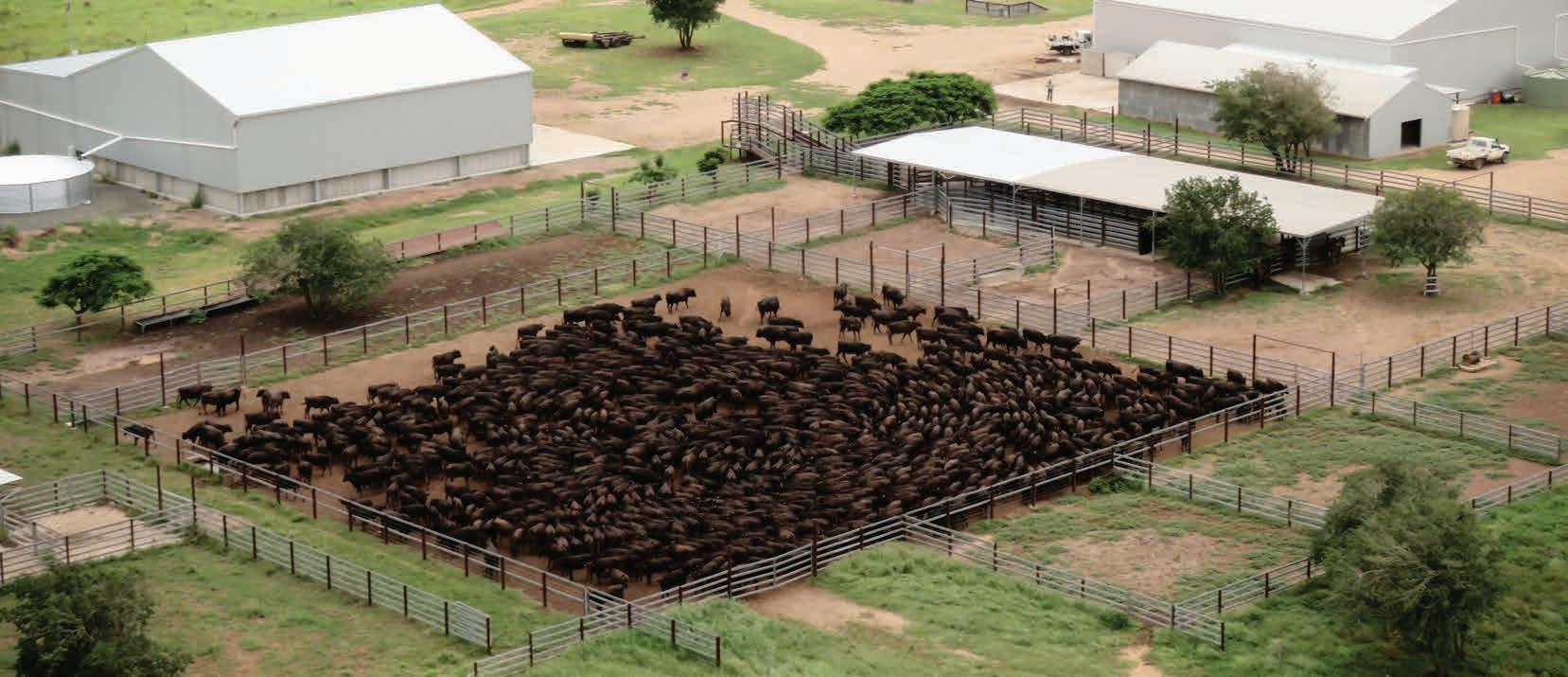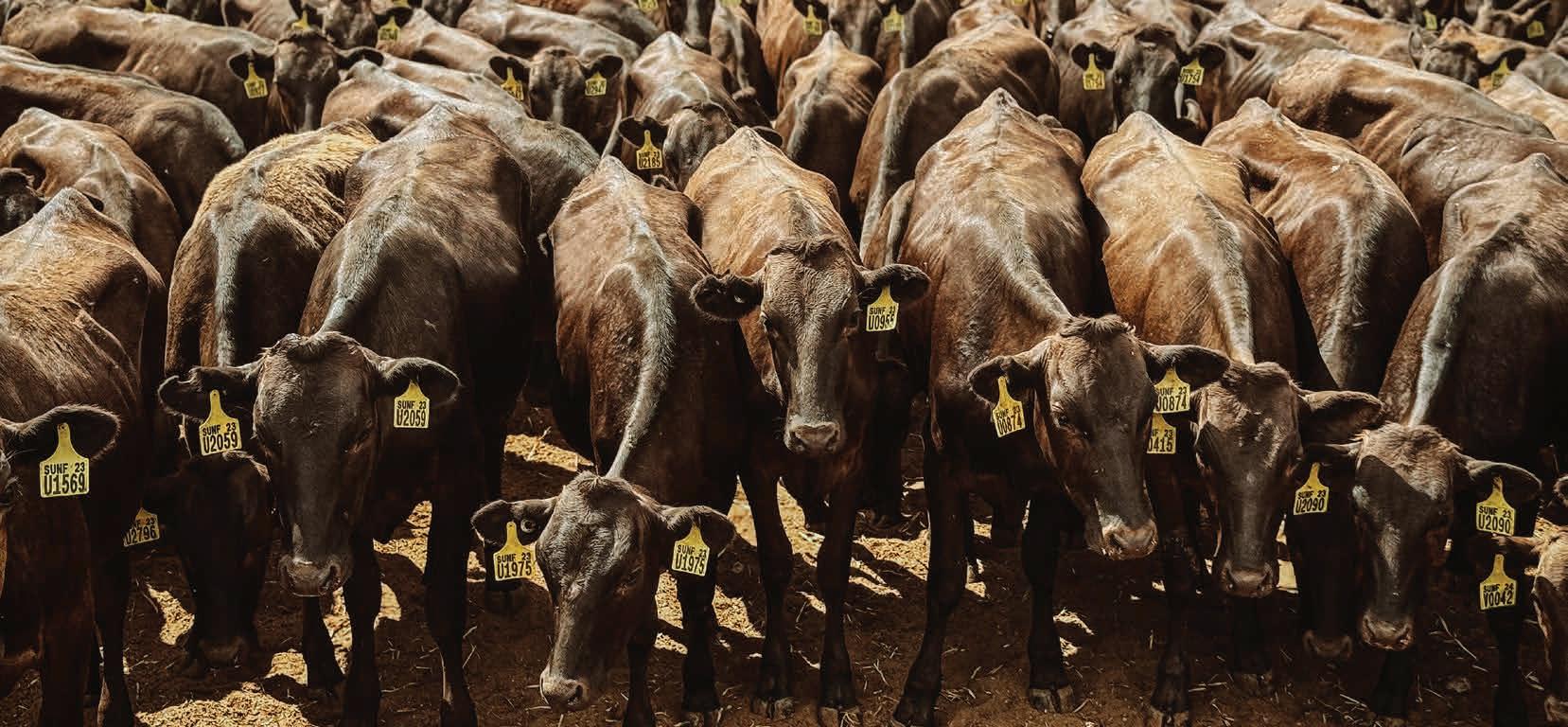
11 minute read
Sunland Cattle Co.
Leading the way in Fullblood Wagyu breeding
Sunland Cattle Co Pty Ltd was founded in 1991 by Paul Harris and is a 100% family-owned business located in Central Queensland, Australia. The journey into Wagyu began in 2007 when Paul, alongside his late wife Clare, acquired over 1,100 Crossbred Wagyu females and Fullblood Wagyu bulls. This marked the beginning of a successful venture, which was further expanded in 2010 with the purchase of an entire Fullblood Wagyu herd of over 500 Fullbloods, embryos, and semen. Today, Sunland Cattle Co. proudly owns and manages over 10,000 Fullblood Wagyu cattle, renowned for their exceptional genetics and premium meat quality.
The Sunland team is dedicated and hardworking, with some employees having been with the company for over 27 years. Each member is highly valued and considered part of the extended Harris family. Key members of the leadership team include:
Paul Harris, Chief Executive Officer (Owner & Director)
Jennifer Harris, Chief Operations Officer (Director, Daughter)
Christopher Harris, Chief Financial Officer (Director, Son)
Sandra-Lee Kirk, Office Manager (Niece)
Jason Kelly, General Manager, overseeing Sunland's two prime properties Old Bombandy Station and Ten Mile Station.
Old Bombandy Station spans 11,072 hectares (27,359 acres) of freehold land and 236 hectares (583 acres) of leasehold land. Located on the Fitzroy Development Road, Valkyrie, Queensland, the property, purchased in 1991, features 23 kilometres of frontage along the Isaac River and 12 kilometres of frontage along the Fitzroy Development Road.
Ten Mile Station, acquired in 1994, covers 6,868 hectares
(16,972 acres) of freehold land on Apis Creek Road, Marlborough, Queensland. It features 8 kilometres of frontage along the Mackenzie River and 15 kilometres of deep-water frontage across two anabranches.
These properties combined grow approximately 15,000 acres of Leucaena, a highly nutritious forage that complements the grasses available to the cattle. As a legume, Leucaena enhances soil health by increasing nitrogen levels and improving soil structure. The established Leucaena plants, coupled with other pasture improvements like Buffel and Green Panic grasses, have significantly boosted the carrying capacity of the land. The properties benefit from an average annual rainfall of 650 mm (26 inches), and both have abundant water supplies. Silage is produced and stored in pits to assist with drought-proofing and ensure year-round feed availability.
Sunland’s Fullblood Wagyu cattle are sold across Australia, with Fullblood Wagyu bulls distributed throughout all states and females sold to breeders seeking Sunland’s superior genetics. The company also markets steers and occasionally spayed females to various feedlots. Over the years, Sunland has made significant improvements in infrastructure, plant, and equipment, contributing to the efficiency and success of the operation.
From conception to consumption
At Sunland Cattle Co., the foundation of their Wagyu operation is built on meticulous backgrounding and nutrition practices, managed by Jason Kelly. These processes are adjusted according to seasons and climate conditions. The breeders graze on Buffel and Leucaena pastures, with supplement feeding provided during drier months through lick, silage, and cotton seed. Calves are introduced to supplement feeding early on using creep feeders. Weaners are also given additional feed on Buffel and Leucaena country until they reach around 250kg. The cattle are backgrounded on this same land, and in favourable seasons, they easily achieve the desired weight gain. During droughts, the cattle are fed a silage ration in paddocks to maintain condition. Bulls are rotated and given silage to sustain their condition during mating. Sunland consults an expert nutritionist who develops feeding programs ensuring optimal growth and performance.
The herd management practices at Sunland are designed to ensure sustainable and healthy cattle year-round. Their focus on consistent nutrition and adaptable feeding strategies allows the herd to thrive, even in challenging environmental conditions. The silage storage system and large feed shed are a part of Sunland's broader drought preparedness plan, contributing to their resilience in difficult seasons.
Sunland’s production process, from conception to consumption, is a highly collaborative effort, driven by data and focused on delivering both commercial success and high-quality results. The team’s attention to nutrition, herd maintenance, carcase weight, marbling, texture, and feed conversion rates ensures that every aspect of the operation is optimised. This approach has led to competitive results, with Sunland winning numerous awards in state carcase competitions, including recognition for best-tasting meat, highest individual carcase value, and best pen of carcase value. Sunland also received accolades for the prestigious Net Feed Intake Award and highest profitability sire honours.
Artificial insemination (AI) is integral to Sunland’s breeding program, with females being inseminated to improve genetics and carcase production. The younger bulls, after proving themselves through data from their naturally conceived calves, are also utilised for AI. Semen is collected from top-performing bulls, but only after their potential has been confirmed.

This breeding method, alongside the use of a small percentage of outside commercially viable semen, ensures that Sunland’s herd remains diverse and high-performing.
Animal welfare is a top priority for Sunland, and they maintain rigorous health protocols, including vaccinations and parasite control. The cattle are raised on quality pastures in Central Queensland, and the company adheres to low-stress handling techniques to ensure the well-being of the animals. Sunland’s focus on sustainable farming practices includes growing Leucaena, a nitrogen-producing plant that benefits both the cattle and the land. This practice enhances the soil's health by sequestering carbon and improving its structure, while also promoting efficient rumen fermentation in the cattle and reducing methane emissions by 20-30%.
Looking ahead, Sunland Cattle Co. is focused on maintaining the production of premium-quality Wagyu beef. With all major infrastructure in place on their properties, they are exploring new ventures and continuing to work with exceptional Fullblood Wagyu genetics. Their data-driven approach helps ensure consistency and quality across their herd, with feed programs tailored by nutritionists to maximise animal performance.
Despite facing logistical challenges, such as unreliable mobile coverage and the costs of cartage to Southeast Queensland, Sunland remains committed to their goal of producing superior Wagyu. Rising feed costs are also a challenge, but the company utilises bulk purchasing and storage to manage these fluctuations. Additionally, unpredictable tropical weather requires constant vigilance, but the adaptability of Wagyu to their environment has proven advantageous.
The Sunland herd is built upon strong genetic foundations, with early bloodlines sourced from Excel Wagyu, which closely resemble those introduced by Chris Walker at Westholme. These cattle were primarily embryos from the USA, incorporating Kedaka, Totorri, and Dai 7 Itozakura bloodlines, as well as the Tajima bull 003. Two significant early females, Kinatomo and Shiromitsu, were direct descendants of one of Japan's top sires, Kitaguni7-8. Their lasting influence on the herd is still evident today. Sunland acknowledges the innovative contributions of people like Chris, whose efforts in diversifying Wagyu bloodlines have played a key role in shaping the herd's future.
With their strong foundation in genetics, a commitment to sustainability, and a focus on animal welfare, Sunland Cattle Co. continues to be a leader in the production of premium Wagyu beef, ensuring their place at the forefront of the industry.
Sunland breeding objectives
In 2024, Sunland bid farewell to the last of their Purebred Wagyu, which had been used as embryo recipients, and now exclusively operates with Fullblood Wagyu. The herd, now numbering approximately 10,000 head, undergoes rigorous genetic testing, with tissue samples collected from all animals for parent verification. All Fullbloods are registered with the Australian Wagyu Association, reflecting Sunland's commitment to quality and excellence.
Sunland’s breeding programs focus on enhancing the pedigree of their herd through careful selection of exceptional bloodlines. The goal is to produce animals that complement the existing herd and meet the company’s high standards. Data from the herd is used to identify ideal sires for females, with a focus on minimising inbreeding while ensuring the economic viability of the breeders and feeders. This approach extends across both operations at Old Bombandy and Ten Mile Stations, into the feedlots, and ultimately to the boning room.
Key traits prioritised by Sunland include, high marbling, marbling fineness, heavy weights, large frames and large eye muscle areas. Additionally, the company works to improve maternal traits in females, such as milk production and mothering abilities, to ensure they consistently produce excellent progeny. Reducing adverse genetic conditions within the herd is also a priority.
Why Wagyu?
Wagyu is simply the best beef in the world! It's unrivalled for its marbling and superior eating quality both in tenderness and flavour. Wagyu cattle are fertile and profitable.
Sunland has long utilised advanced reproductive technologies, including Artificial Insemination (AI), Embryo Transfer (ET), and In Vitro Fertilisation (IVF), to accelerate genetic progress. Annually, between 3,500 to 4,000 females undergo AI, with all females backed up with quality Sunland-bred bulls. Sunland has also carried out over 800 Embryo Transfers in one year.
The company uses the Outcross Stockbook system to record detailed animal data, including weights, joins, treatments, and movements, from birth to death. This enables the tracking of animal performance and breeding information across both properties, ensuring lifetime traceability for every animal.
Sunland also collects individual carcase data from abattoirs, which provides valuable feedback on their breeding programs’ performance. The company uses MasterBeef and BREEDPLAN information to analyse animal performance and inform future breeding decisions.
With a commitment to advancing their herd’s genetics, producing high-quality meat, and maintaining a sustainable and efficient operation, Sunland Cattle Co. continues to lead the way in Wagyu production.
In recent years, the Harris family has observed a surge in the prices of Wagyu cattle, which, in turn, led many commercial producers to enter the Wagyu market without fully understanding the immense resources and commitment required for success. This influx of unproven feeder cattle has created an oversupply, a scenario that has been seen before in the industry. While market conditions have stabilised, the current Wagyu market remains heavily influenced by external factors, such as the Australian dollar and international export markets—variables that are beyond individual producer control. The Harris family does not anticipate significant changes in the near term.
Despite these challenges, Sunland Cattle Co. has continued to find Wagyu cattle more economically viable than other breeds. Through data-driven decisions and a relentless commitment to improvements, the Harris family has consistently achieved substantial returns, even during the toughest conditions. Their dedication to the Wagyu industry remains steadfast, as they navigate its inherent ups and downs with confidence.
Over the past three decades, the Wagyu cattle industry in Australia has made significant strides. With ongoing innovation and advancements in data collection and science, continued improvements are on the horizon. At Sunland, genomics has been one of the most reliable advancements in breeding, enabling them to further elevate the quality of their herd.

Sunland and the AWA-PTP
Sunland has been involved in the Australian Wagyu Association Progeny Test Program (AWA-PTP) from the beginning, and currently into their fourth year of joinings as a contributor herd, having produced 440 progeny from the first three cohorts. The AWA PTP is run in conjunction with their own breeding programs with the progeny produced, grown and backgrounded the same as all other Sunland progeny. Throughout the program, they have also nominated 2 sires
SUNFH2241 - Sunland Itoshigenami H2241 and SUNFH0035 - Sunland Yoi Rei R35
The AWA progeny trial gives Sunland an opportunity to benchmark how their sires compare with another cohort of sires external to their herd.
The Harris’ said being a part of this program has entailed more work, but they have benefited by increasing their pool of genetics (including overseas sires not previously used in their herd) and they will continue to collect, record and analyse all data to enhance the accuracy and reliability of their own genetics.
Sunland’s dedication to supporting the AWA PTP shows their commitment to advancing the Wagyu breed as a whole. Participation in this program not only benefits their operation but also contributes valuable data that drives breed improvement across the entire industry.

The Harris family is confident that Wagyu will continue to experience rapid growth within the Australian cattle industry. The breed’s many advantages—its high value, strong fertility, excellent temperament, superior carcase quality, and adaptability— ensure that its prominence will only continue to grow in the years to come.
Why our participation matters
Data collection and benchmarking
Contributing performance data helps identify superior genetics and provides benchmarking for growth, marbling, and maternal traits across different herds.
Industry-wide progress
By collaborating with the AWA, Sunland are fostering innovation and supporting research that benefits the broader Wagyu community.
Mutual benefit
Their focus on herd improvement through AI, ET, and advanced management aligns perfectly with the goals of the AWA PTP, creating a win-win scenario. The data they generate helps guide their breeding decisions while advancing the genetic knowledge base for Wagyu in Australia.
Research and development focus
Their proactive approach to embracing research and technology further positions Sunland as an industry leader. AWA is to be complimented on their bold innovation. Sunland would also like to thank the AWA staff involved in this project as they have been very obliging and professional throughout this project.


